A life on the street, a life in a van—after more than four years in Africa, we thought that nothing and nobody could stop us. But then came coronavirus.
Africa
We spent 1,561 formative days on the African continent, and every country left its mark—a total of 36 countries, 49 border crossings, and countless roadblocks with corrupt officials issuing citations for anything they could think of, including the windscreen water container, to justify extracting some money from us. The AK47(Kalashnikov) is as much a part of the streetscape as umbrellas in Germany’s autumn. Small talk with the military and the police defined our everyday life as much as bizarre landscapes, fascinating encounters with humans and animals, and wild camping spots in the most curious of places.
In mid-February of 2020, we wistfully depart Africa by ferry from Sudan, and at the same time are excited to discover everything a new continent has to offer. But by now, the term COVID-19 is appearing more and more frequently in the media. What does this mean for us as travellers, we ponder anxiously.
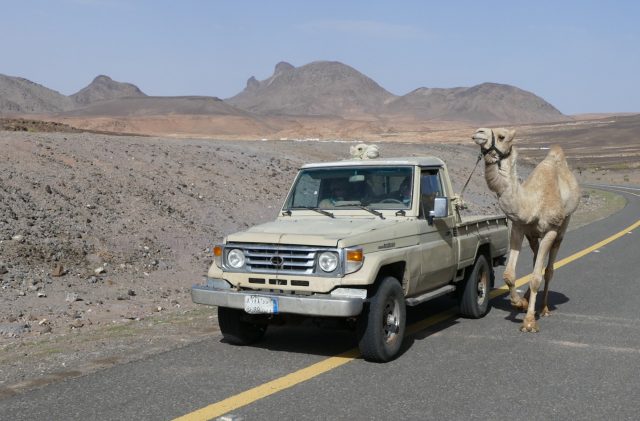
The Kingdom of Saudi Arabia (KSA): First Impressions
Colourful clothing worn with irrepressible enjoyment of life has given way to a black-and-white colour scheme. The men wear white robes (thoben), the women hide their bodies under wide, black capes (abayas) with the corresponding black headscarf, often leaving only the eyes to be seen. The endearingly chaotic and sometimes annoyingly unorganized is replaced by a clean and orderly cityscape. All roads are paved. No trace of potholes. Daily life appears regulated (more serious and inflexible) and is brought to a standstill by prayers five times a day.
We are relieved to find that under the Koran, corruption is prohibited. No one is begging. The country has good infrastructure and impeccably equipped modern hospitals in sufficient numbers. We are particularly reassured by the latter, especially now, in times of the virus.
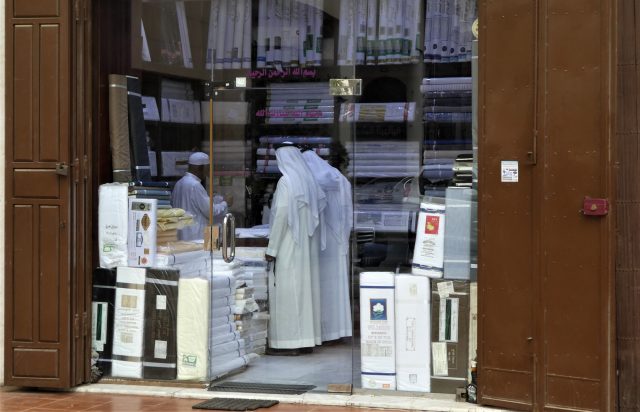
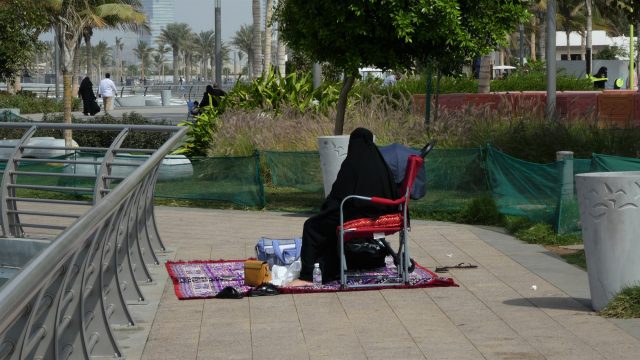
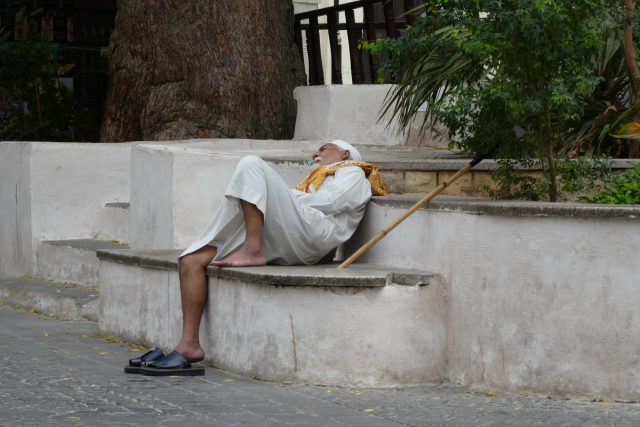
Additionally, the Arabs seem pleasantly reserved, extremely hospitable, and generous. As in many other countries, we are warmly greeted in Saudi Arabia with “Welcome.” But soon, we will also be addressed with “Corona,” and other travellers even with “Go home.” This gives us pause to think. What will happen if the situation worsens? Are we foreigners being held responsible for the spread of the virus, soon to become bogeymen and targets of hostility?
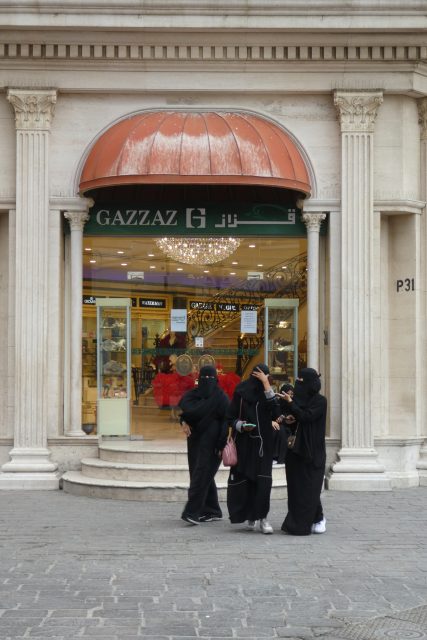
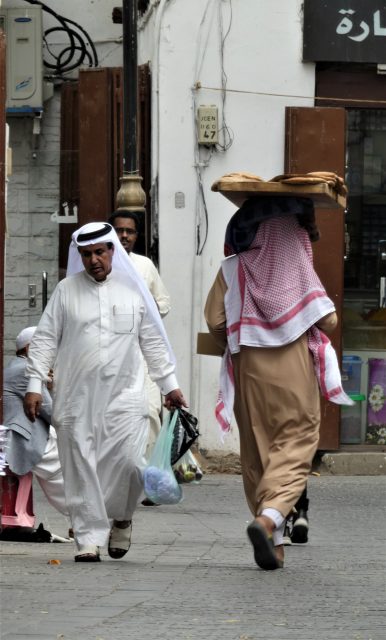
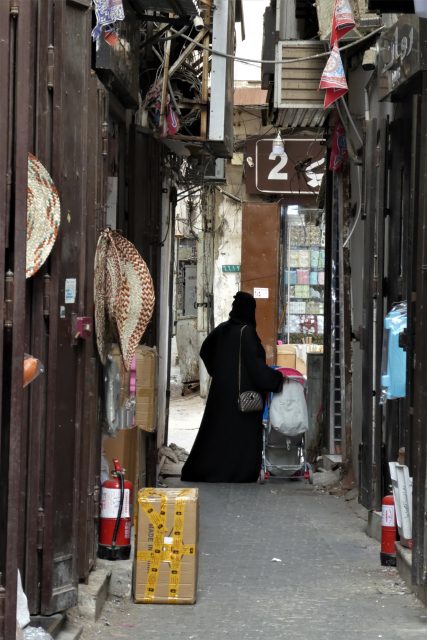
But From the Beginning
The first Coronavirus case occurred in Saudi Arabia on February 3, 2020. The ruling Crown Prince Mohammed bin Salman closes the country’s borders as early as March 7. On March 15, Saudi Arabia ceases all air traffic, and Oman (our planned milestone for the beginning of April, before going back to Germany via Iran) closes its borders. We learn about the border closure on Friday, March 13, late in the evening, with two days’ notice! Damn! We are more than 2,000 kilometres away from Oman and have to enter via the United Arab Emirates (UAE) (two time-consuming border crossings), as the direct border crossing between Saudi Arabia and Oman has not yet been opened. Even if we left immediately, we wouldn’t make it.
All borders around us are already closed; only the UAE is now left as an “exit” and next stage of travel. Our freedom of movement is limited. The facts are clear. Our feelings, mixed. The next morning we discuss our options with Oli and Dagmar, two overlanders with whom we have been travelling for a few days. Which of the two countries (KSA or UAE) is better suited to wait out the opening of the borders? The UAE offers some benefits. The carnet is valid there. Our Ford E-350 Sportsmobile 4×4, VAnGO, can be parked there until autumn. We don’t need a visa. We also expect air traffic to Dubai to resume in a timely manner. On the other hand, at the end of the 90 days of stay granted in the KSA, there is a risk of high post-clearance fees or scrapping of the vehicle. Real consequences. The KSA did not open its borders to tourism until autumn 2019. Could this freedom be reversed, and visas will no longer be issued in the future? If we were to evacuate by air, we would have no chance of returning to Saudi Arabia and leaving the country by car. The four of us agree: the UAE is the better choice.
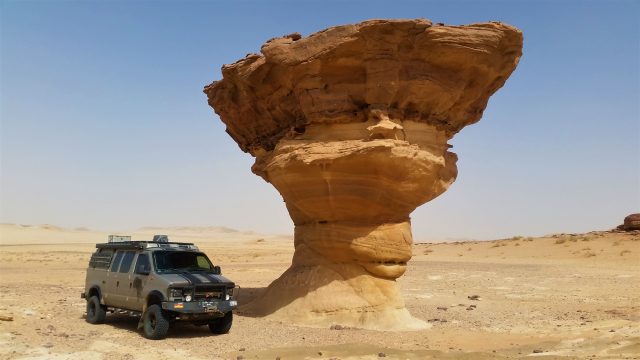
On our way to the UAE, we stop at the rock formations in Jibal Al-Rukkab since we haven’t seen much from Saudi Arabia yet. The air is cloudy, which shrouds the sandy gorge with its sandstone columns hundreds of meters high in a ghostly light. But despite the fascinating surroundings, on the afternoon of March 15, on the second day, we leave the reddish shimmering landscape towards the UAE.
Finally, back in an area with internet reception, we learn through the WhatsApp group “Saudi News-stranded Overlanders in Saudi” that our last exit will close in two days. We have until March 16 at midnight and not a minute longer. That’s 33 hours! Immediately we hit the road and postpone discussions until later. At 110 km/h, we race along the country road. There are still 1,600 kilometres to the border. We will have to pass through several major cities, including the city of Riyadh. It is 3:00 p.m. with heavy traffic. The nervous tension is immense, as we are not sure which is the right decision: racing through or staying here? Didi is driving, whilst I try to research information via WhatsApp, the internet, and our friends Dagmar and Oli, who are doing the same thing.
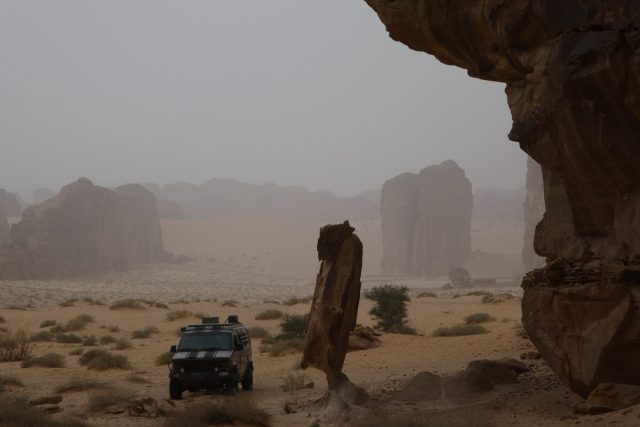

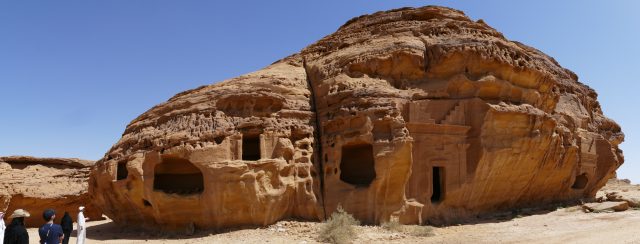
Can the duration of stay for vehicles and our tourist visas be extended? The rules for foreign vehicles are not yet fully developed. Tourism is too new. We are told to contact the main customs authority in Dammam, but no one speaks English there. I call the Immigration Department. Here, I only get vague information about the possibility of renewing our visa. This is too much uncertainty. Our thoughts are turning in circles. If only the customs question had been resolved, then we could save ourselves all the stress and this race against time. The Saudis are driving fast, sometimes reckless, and so driving at this speed, which is quite high for our VAnGO, is not completely without risk. Shortly before nightfall, I receive a text message from Dagmar and Oli. They no longer want to deal with the driving stress and understandably give up. Wistfully, we say goodbye, feeling very alone as we continue. My thoughts are racing, and so is Didi. It is dark. We are not moving as fast as we had hoped.
I research climate tables. During the Arab summer, travelling becomes unbearable for us Europeans because of the high temperatures and the humidity. Only in KSA, there are high mountains, in which the temperatures still can be endured at night: a plus for KSA. The number of coronavirus cases is another factor in the decision-making process: just over 100 positive cases are registered in Saudi Arabia. The number in the Emirates is many times higher. Saudi Arabia is much larger than the Emirates, which makes it easier to keep distance from people. The thoughts are going round and round: on a flight home, we could get infected. Didi is an asthmatic and over 50, so he is in a risk group. I would like to see my parents. A curfew may be imposed in Germany. Can we quickly find a parking space for our van should we decide to fly home? We would also have to pack (“mothball”) VAnGO so that nothing moulds in the UAE’s high humidity. Would planes still fly until we are done with all of that? If not, we would be stuck in the extremely hot emirates, perhaps for months.
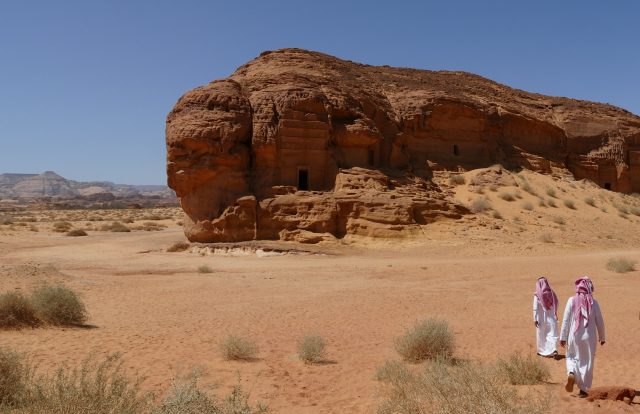
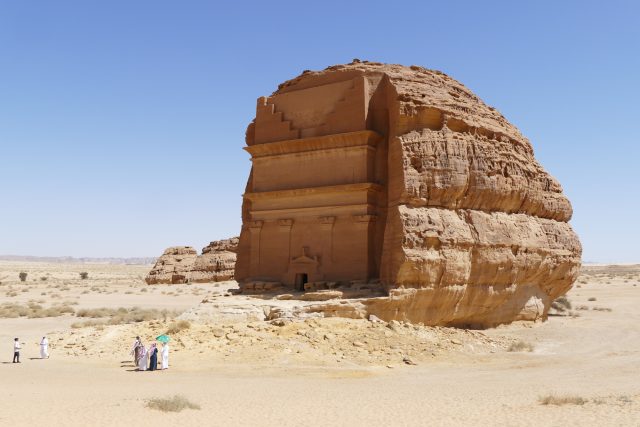
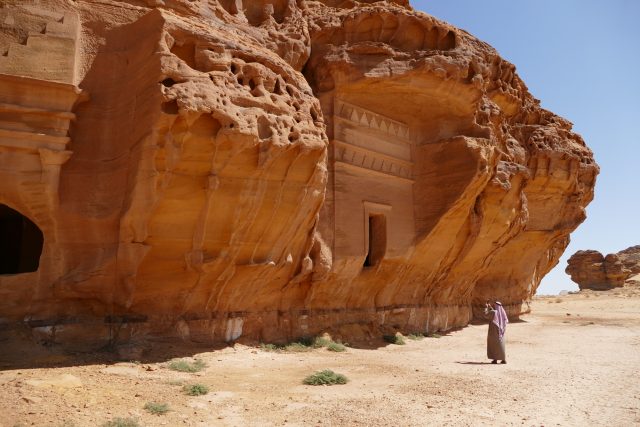
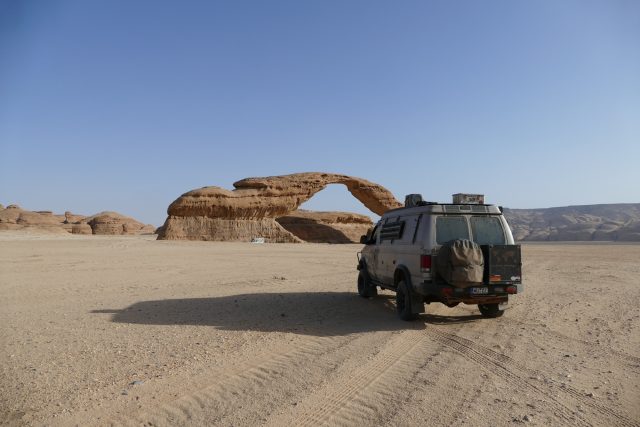
Didi and I are constantly discussing the pros and cons, turning in circles. It is March 15, 10:00 p.m. We have 26 hours left. It is still 1,100 kilometres to the border—two border crossings. We still have to pass through two big cities in Saudi Arabia alone. The road conditions of the last 500 kilometres before the border are apparently very poor. We must travel through the night, and traffic will increase from Riyadh onward. Are we suicidal? I received a message from overlanders who already had valid visas and written assurances from Oman that the border would be open until midnight, March 15. The Emirati border officials advised against leaving the UAE. Oman had already closed their borders in the morning. If they wanted to leave despite the well-intentioned warning but were denied entry to Oman, they would be denied re-entry into UAE and have to stay in the no man’s land between the borders. This news makes our hearts go heavy; it is now clear that it is not certain, firstly, whether the border into the UAE will actually be open until midnight tomorrow and, secondly, there will, unfortunately, be no African solution if we reach the border with the UAE too late. And what does too late mean? Our acquaintances were on time and turned away regardless. Our nerves lie bare. At 10:30 p.m., we decide to call it a night and drive into a truck stop. We stop this crazy race against time (towards the UAE border) right here and now. The next morning we feel quite good despite a restless night. We have come to a decision: we will stay in Saudi Arabia. As to whether it is the right one, we do not know. Our tension has dropped off— for now.
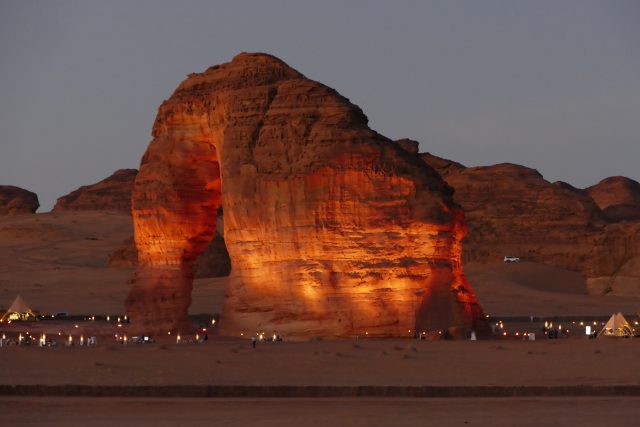
Stuck
That same day, the shops close. Only mosques, grocery stores, petrol stations, and hospitals remain open. A few days later, the mosques close. What a step for a country like Saudi Arabia, whose daily life is defined by faith. We register with Elefand, a page of the German Foreign Office that takes care of Germans in need abroad. This way, the German Embassy in Riyadh will be able to keep us updated on the country’s current situation. As we are not making any progress with the local authorities due to the language barrier, we turn to the German Embassy with our specific customs questions. Since air traffic is suspended in Saudi Arabia, we cannot be flown out. Additionally, their priority is bringing back Germans from so-called holiday destinations, such as Morocco, Indonesia, etc. Saudi Arabia is not on that list at all, not even at the bottom. We feel left to our own devices by our government. Only the WhatsApp group we founded, connecting a handful of individual travellers scattered across the west of the country, offers us support and information. Thus we don’t feel so isolated in this foreign country.
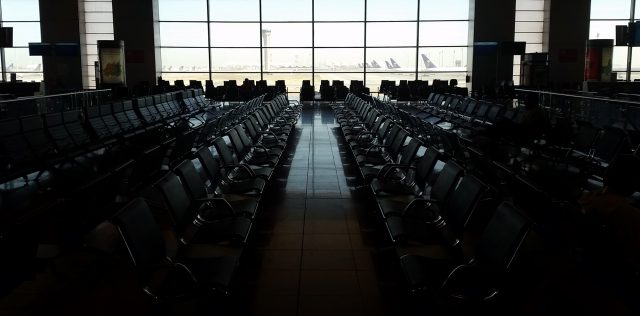
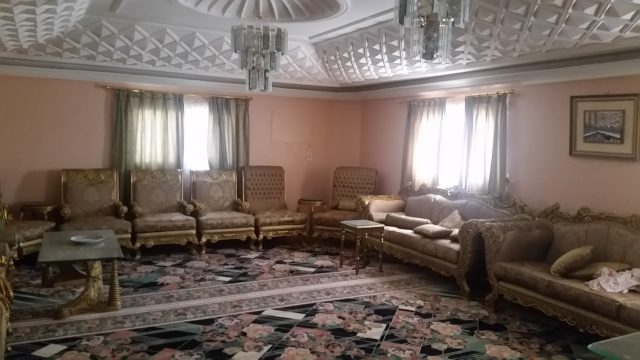
We drive to Al-Shaq Canyon, because in times of the virus, there is no better place than the desert. Above a dried-out waterfall with a unique view over the gorge, we find a nice place to stop. There is water and even internet reception here if you climb the mountain next to it. Only a goat herder comes by, who wants to shake our hands. He is not worried, because coronavirus, he believes, exists only in Riyadh. Here you have fresh air, and so he is healthy. All the same, we don’t shake his hand, and as one of his goats sneezes, all three of us say in unison “Corona.”
From March 23, the prince imposes a curfew from 7:00 p.m. to 6:00 a.m., initially, for a period of 21 days. Our freedom is further restricted. From fellow travellers camping not quite as remotely as us, we learn that they were woken at night by the police and taken to the police station. A motorhome is not a home. This is a breach of the curfew and costs EUR 2,500 per person. You should always go to a hotel at night. This doesn’t sound good, because our tight budget isn’t suitable for expensive hotels, let alone hefty fines. We consider what to do and are caught up in the prince’s next decree
On the afternoon of March 25, we learn that the provincial borders will be closed by tomorrow evening. These short notices put us under heavy pressure. At the same time, Dagmar and Oli offer for us to join them in a vacant summer residence, belonging to a Saudi friend, in the mountainous province of Al-Baha. We would have to cross three provincial borders. It is 1,300 kilometres to the cool mountains. Behind high walls, there awaits a garden, with olive and almond trees, herbs, vegetables, a communal room, toilets, and a shower. An ideal place in case a total curfew is declared.
The Escape Begins
The off-road route to Al-Shaq Canyon was not without difficulty even in daylight. Shortly before sunrise, in the semi-darkness, we hardly find the way back. Just don’t take the wrong track now or get stuck in the soft, deep sand. We don’t have time! Arriving on the tarmac, we follow the winding road down through a barren mountain landscape to the Red Sea. Fortunately, there is hardly any traffic. On the straight coastal road, Didi sets the cruise control at 110 km/h. The air is sultry and sweltering, but we are getting somewhere. Since we have been travelling with smaller tyres, an emergency purchase, since Kenya, we’ve had concerns about the low load capacity and normally don’t exceed 80-90 km/h. But now we are in a hurry. We only have time for fuel and toilet stops. Date biscuits keep us nourished. Because of the Omani border closure, we are anxious that the provincial borders have police checks already.
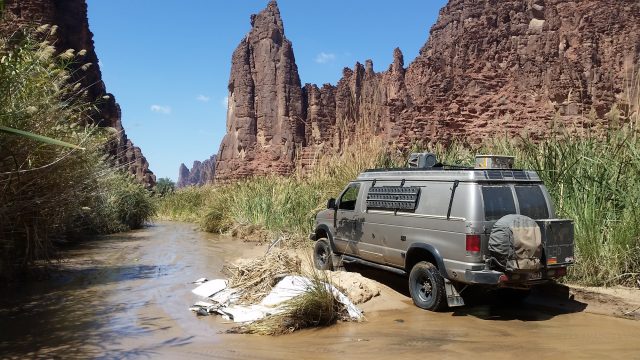
In order to stay updated on the situation, I’m in contact with Wael, a Saudi friend. He is able to read the original Arabic texts and thus rule out translation errors. He texted: “Speed up. You have until 3:00 p.m.” Four hours less than expected! Does this push our goal beyond reach? We don’t want to burden each other with our gloomy thoughts, so we continue to rush onward in silence. To our astonishment, we pass the first provincial border from Tabuk to Medina, almost unnoticed. There is no police check or roadblock. This gives us hope. At 2:05 p.m., after a total of 700 kilometres, we drive into the second province. We are progressing nicely. Now there is only one border between us and our safe haven. Because of the total curfew in force for big cities, we still want to pass Jeddah today. Considering the traffic chaos, this could be touch and go. We no longer stop.
Whilst driving, I climb into the back of the car to prepare sandwiches and provide Didi with sustenance. Sweets are now our main provisions. There is surprisingly little traffic on the bypass. There is no rush-hour traffic as usual for this time of day. Again, we are getting through without problems and are now seriously considering whether we could still make it to the province of Al-Baha today. Who knows if by tomorrow all provincial borders will be hermetically sealed!? In our direction, three 6×6 MAN trucks rush past us. A lot of police cars are coming towards us. Where are they going? What are they up to? It dawns on us that they are cordoning off Jeddah. A travel ban has been imposed on the big cities. No one is allowed in; no one is allowed out. South of the city, Didi sets cruise control to 120 km/h. I hold my breath, listen to every unusual noise, and have a peek at the tyre pressure indicator more often now. Our tyres have never been so hot. At what temperature, in combination with speed and tyres that are too weak, does a tyre burst? Due to the heat and excessive speeds, the remnants of busted car tyres lie everywhere on the roadside, visual confirmation of my unspoken fears.
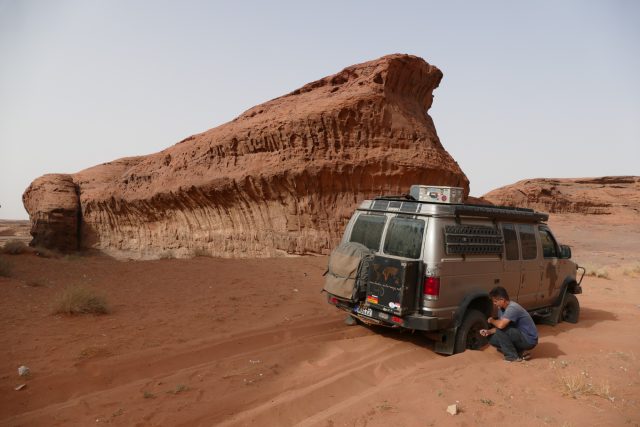

Feverishly, I look for a shortcut to the province, because it is now impossible for us to reach the border before the curfew time on the route indicated by the GPS. Finally, I find an alternative route 40 kilometres shorter—a few kilometres that could make all the difference. But is this a sealed road? A time-consuming, unpaved road is of no use to us now. Passing by, we see that it is sealed, hopefully, all the way to the provincial border. After that, we don’t care about road conditions. We cannot turn left but must make a lengthy detour to the next U-Turn. Valuable minutes. It’s getting dark. The provincial border is still about 20 kilometres away. The clock shows 6:50 p.m. The curfew starts in 10 minutes, and the penalties are immense.
Discussions are fruitless. We are no longer in Africa! VAnGO wobbles. Something is wrong. Didi suspects that at least one tyre gives up the ghost. There is no time to stop and linger. (As it turns out later, our concern was justified. The casing of a tire detaches from the tread.) At 6.57 p.m., just ahead of our destination, we have to give up. In the dark, we turn into a path that leads away from the main road. It ends on the top of a hill. Great! We had wanted to hide behind it and not stand for everyone to see! But we have no choice if we don’t want to get stuck in the sand dunes. Turn off the ignition. Tire check. A little bit to eat. Tired and exhausted, we fall into bed. At night I hear car noises from the nearby street. “They have to have a special permit,” I think, before falling back into a restless sleep. I dream of heavy MAN military vehicles positioned across the provincial border—of serious, merciless guards who won’t let us pass.
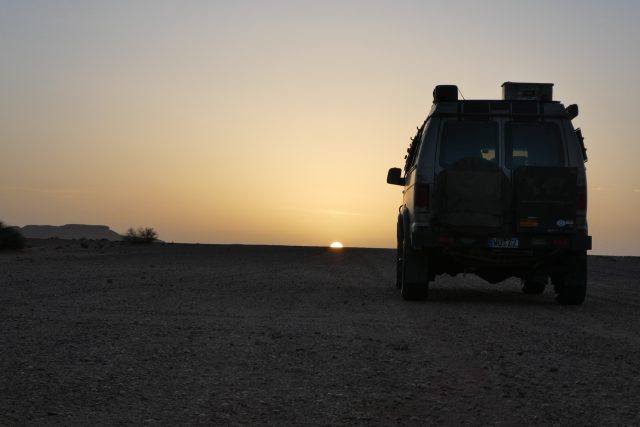
Hoping to slip through before the roadblock is set up, we start early the next morning at 6:00 a.m. We are nervous. As we approach, we see barriers lying readily on the side of the road and a guard who just disappears behind his car with a flashlight. As quietly as possible, we let ourselves roll by. When the guard bends down, Didi accelerates, turns to the right, and thus enters the new province. Nobody is chasing us. Our relief cannot be described in words. High five. Deep breaths. Pedal off the metal!
The Summer Residence
The winding pass road is spectacular, and shortly afterwards, we reach the summer house. Hamdullah! The tyres, except for one, have persevered. Completely exhausted, we are welcomed by our friends, who spoil us with delicious food. With hot shower water, we rinse our tension down the drain. During the next few days, we recover and prepare ourselves for a long stay. Rasheed, our landlord, is concerned for our health. He sends a delegation of three nurses in full protective suits to measure our temperature. We are provided with an incredible amount of food supplies, and the gardener, Awais, brings fresh flatbread for breakfast every morning. We are doing well in Al-Baha. The unconditional hospitality of the Saudis puts us to shame.
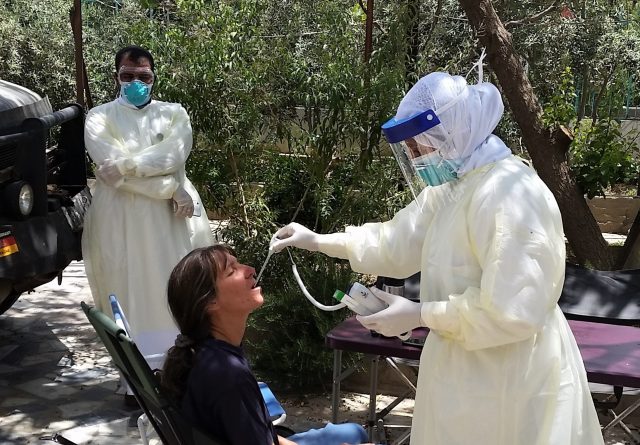
The Decision
This place is like paradise. Only the unresolved questions and concerns that arise again due to the ever-increasing number of infected people are clouding the idyll.
Our intuition tells us the border will not open before August, the time of the great pilgrimage to Mecca. Although the Hajj, which is attended each year by about two million Muslims from around the world, has not yet been definitively cancelled. Our visas are only valid for one more month. We have not been able to resolve the customs issue in the last five weeks. We cannot park our cars on the grounds of the German Embassy, the only place in the country that would be safe from Saudi custom’s access, at least in theory. Verbally, we are told not to worry about our vehicles. Nobody wants to confirm this in writing. Our feelings are mixed, but we have decided to fly home.
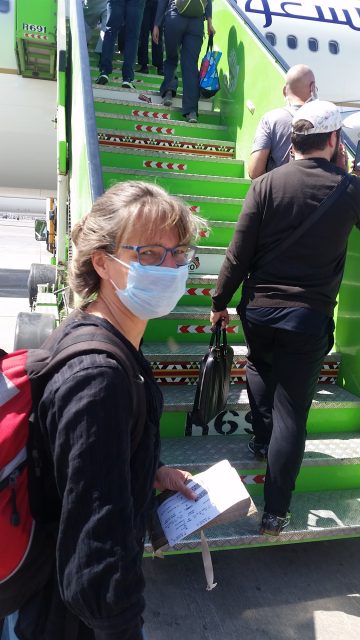
We have to effectively organise the departure ourselves because the German Embassy is again proving to be of no help. A great deal needs to be clarified and fine-tuned. Again and again, we receive information about departure days of the few commercial flights too late. The tightened curfew from 3:00 p.m. to 6:00 a.m. means that Jeddah is a day trip (400 kilometres), and Riyadh at least three days’ travel (1,000 kilometres) away. Both cities have total curfews and entry bans. Where we can and are allowed to stay overnight, the embassy cannot tell us. We’re also on our own when it comes to crossing the provincial borders, we are tersely told. In search of a shelter for VAnGO, we extend our search to social networks and find what we are looking for. Hamza owns a large company. He has space on his land for two cars in both Riyadh and Jeddah for an unlimited time. We don’t know him personally, but he always likes to help other travellers, he says.
One problem solved. A few days later, we learn about a flight to Vienna through the Austrian embassy. Great, that’s the one we want! The challenge is to organise all the documents in a single afternoon because we have to leave in the early hours of tomorrow if we are to catch the flight from Jeddah. Since we want to fly together, Oli books the flight for the four of us online. When paying, however, his credit card is not accepted. Shock and horror! Didi pulls out his credit card, and we all hold our breath. Pheww! Payment accepted. Now we need transportation from Vienna to our hometown in Germany. Without proof of onward journey, the Austrians will refuse to let us enter. We check car and bus prices. The train wins. It is 175 euros for four people from Vienna to Würzburg. For the trip to Jeddah, we still need travel permits for us and our cars. We remind the German embassy in Riyadh of the urgency and, after a few appeals, receive an “absolutely forgery-proof” permit from the German consulate in Jeddah: “Officially authorized evacuation transport to King Abdulaziz International Airport Jeddah,” can be read there (at least in Arabic). Without stamps. Without seal. Without sender. Without signature. Shrugging at the unprofessionalism, we hope the Saudi police are satisfied with it.
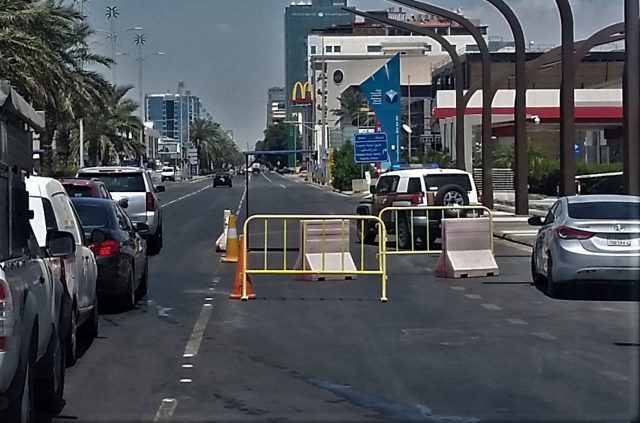
At the first checkpoint, they only check the opposite direction, and we scurry through. The next official is not really interested in the document; he is satisfied with our verbal assurance that we are on our way to the airport and lets us pass. However, we notice some vehicles being sent back and forced to turn around at the checkpoint. Finally, we reach Hamza’s garage—a stroke of luck! The garage is more like a hangar, air-conditioned, and obviously serves as a storage space for his private vehicles. We are overjoyed and overwhelmed by the generosity of the Saudis.
There is one thing we need to clarify: how do we get from here to the airport tomorrow morning? Public transport and taxis are not allowed. The consulate plays hardball at first but then offers us a car with a driver. We are picked up on time and meet the staff of the German consulate at the airport. The pleasant lady quickly strikes us off her list with a wink: “This problem group can finally leave KSA.” Handing over a bag of Halal gummy bears, she wishes us a good flight. Without further health checks, we board with about 80 other travellers of different nationalities. Europe, here we come.



